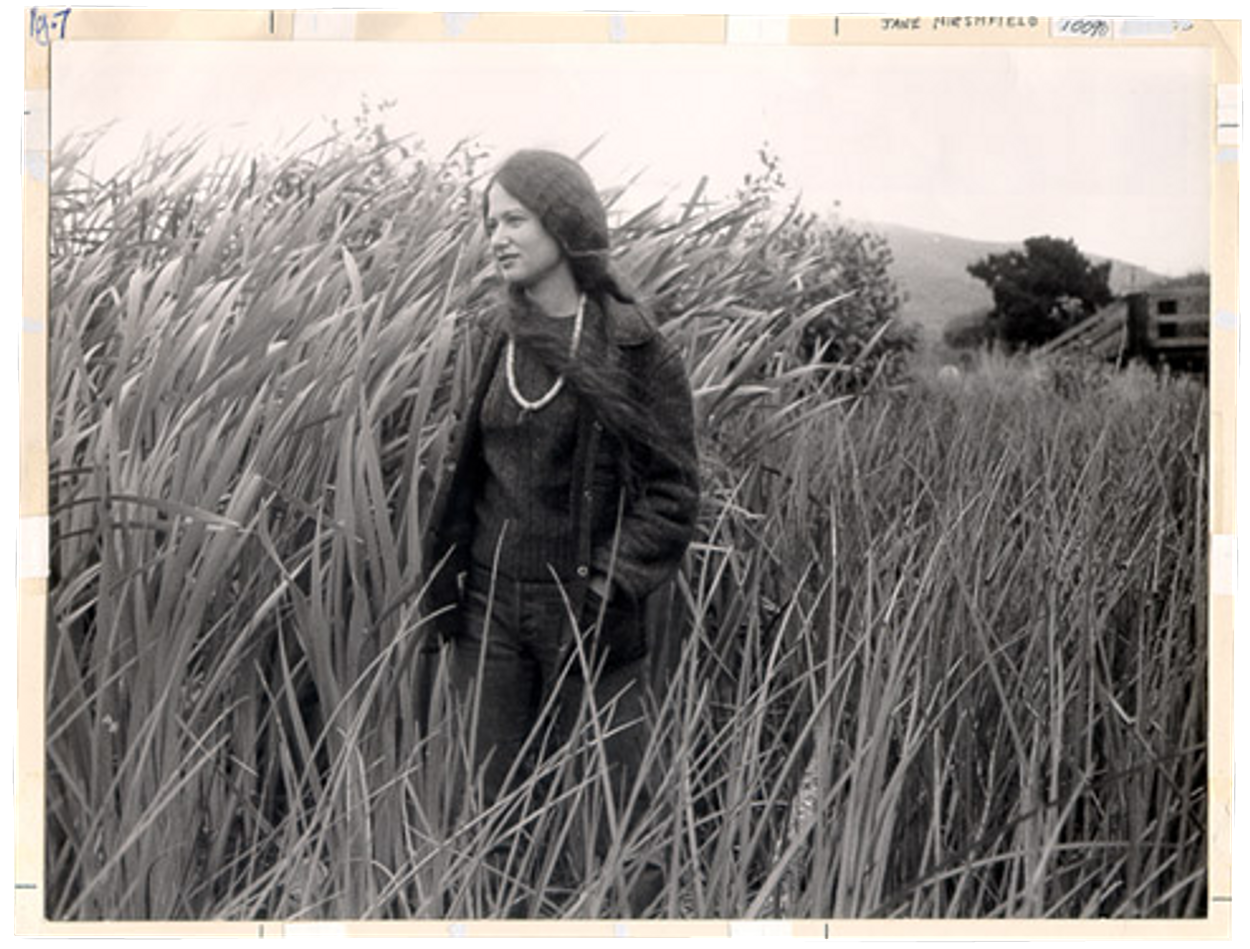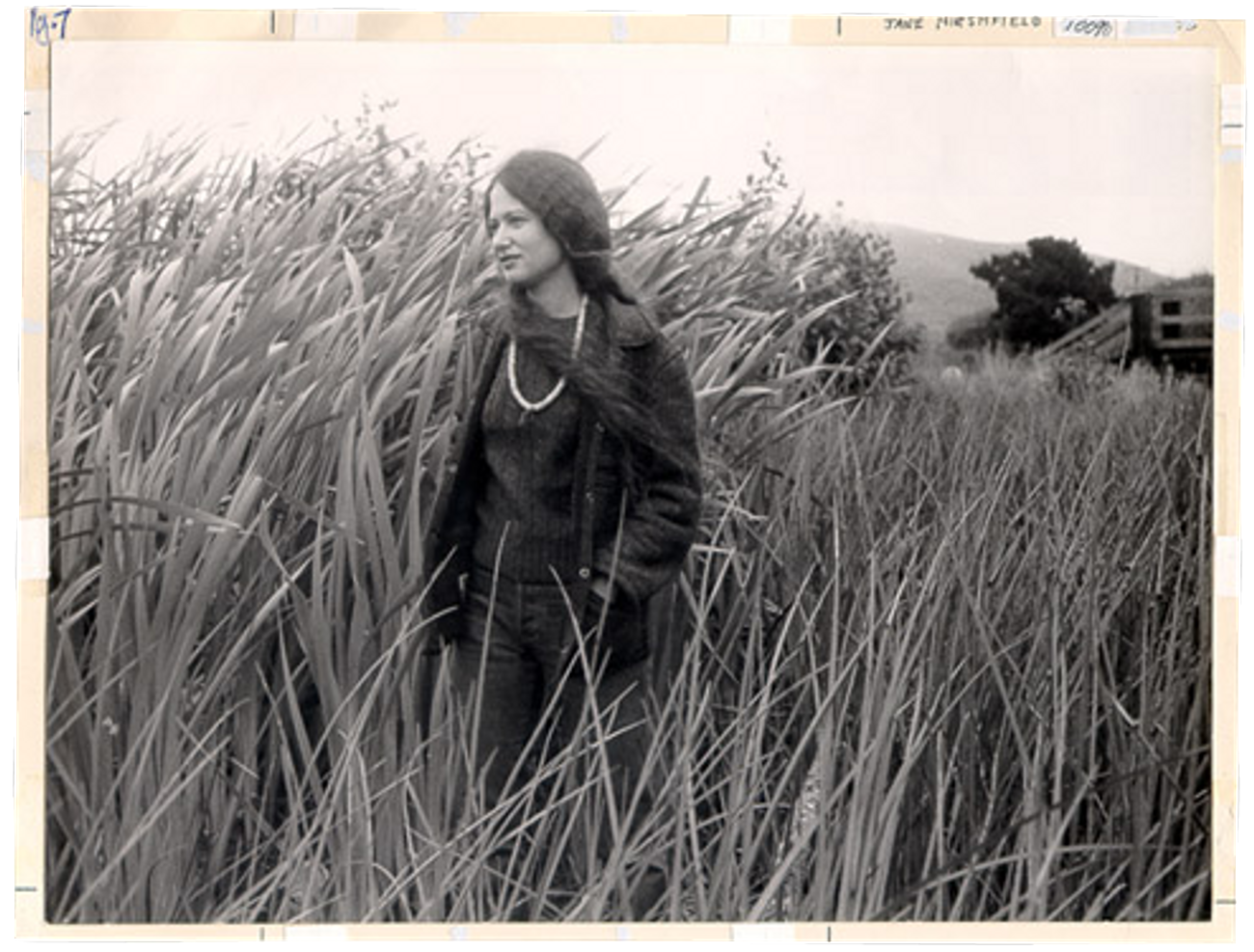Before the Collapse
Jane Hirshfield’s new poetry collection, ‘Ledger,’ arrives at the ‘penultimate’ moment




“A moment knows itself penultimate,” I found myself repeating, almost chanting, as I ran, recently, through Stanford University’s campus, eerily empty. This opening line of Jane Hirshfield’s poem under the same name, suddenly came back to me in full force. In early March, I went to see Hirshfield—author of numerous acclaimed poetry and essay collections, recipient of major poetry awards. I came to talk about her new book, Ledger, and brought up the word “penultimate,” and this very line, which then felt poignant, mysterious, attractive—yet, somehow, still at an arm’s length from my reality. Between then and now, a great deal has shifted, and suddenly, as I ran, I felt Hirshfield’s line cutting right through the present and beyond it, into the deeper recesses of my own past.
I remembered other moments of uncertainty in my life. When I was 11, the country I was born and lived in—the Soviet Union—had collapsed. With it, collapsed the system of beliefs I was brought up on, social and political structures of the familiar. But what was most fearsome was not the end itself—which, if anything, as I intuited from the adults around me, felt liberating. It was the moment of uncertainty that hung in the air during the days of the coup that preceded the collapse. It was clear that something major was afoot, but what it was going to result in, none of us could tell. Something was penultimate, as in the poem:
A moment knows itself penultimate—usable, spendable,
good yet, but only for reckoning up.
A moment knows something’s almost over, but not what it is.
There is still time, the day sings its old round, time still is here, though you can’t hear
the new thing arriving inside the knots of its ticking,
though you can’t feel the brush of its wing on the nape of your life,
or hope for the voice
to arrive, as it has always, saying,
“Come, I’ve returned to you, here is your gift.”
The moment finds itself weary, blindered,
language confuses its ears.
Some things that are frayed
can be
turned inside out, can be darned, can be quilted.
Others are used up completely.
It’s like the custom for the widow at certain funerals—
Friends speak,
children,
the many and long-disguised lovers.
The widow’s task is different. She does not speak.
This is a dark, foreboding poem, which, like numerous others in the volume, speaks with mournful compassion of an impending loss, one on a global scale. Yet it also points toward continuities, and the beauty that surrounds any given moment, no matter how fraught. The strangest and most mysterious part of the poem is the sense of agency, given to the “moment” itself. It’s not that we know the moment to be penultimate—it’s that it itself has a power of self-awareness. How can that be? Can time be conscious? Of course not—and yet, as I read the line to myself, it drew me in, as if beckoning toward something that only a poem could convey.
The poem’s image of “the knots of its ticking” doesn’t clarify matters either, as it clashes together two separate metaphors—the time’s ticking as well as knottedness, like that of a sore, tight muscle. This sense of metaphoric entanglement goes together with the pure music of the phrase, its gorgeous consonance and repetition of the letter “t”, which feels like a quick series of punches or spasms. It is a purely visceral, bodily image, an animal sense of something to come. As Hirshfield called it, the “sense of a fear that runs through this book and hopes to be found unfounded and true … that we really are witnessing collapse and destruction of the world that we grew up in.”
Whatever the fear, we’re still also witnessing the “brush of its wing on the nape of your life”—an image that feels incredibly sensuous, even luxurious, even if we are given to understand that this is something we “can’t feel.” The sensuousness is both given and quickly withdrawn.
And what of the final, utterly unexpected image of the poem—that of a widow at the funeral? There’s a chilling realization in the comparison between the “penultimate moment” and the experience of a widow—one left with a gaping absence, mercifully granted the luxury of silence. The parallel drawn here strikes hard, like a lightning.
Indeed, there’s an epiphanic quality to many of Hirshfield’s poems. It is also the subject of her famous essay “Poetry and the Constellation of Surprise,” where she explains that “creative epiphany” is “a knowledge won against the patterns of predictable thought, feeling, or phrase.” When I asked her further about the role of epiphany in her work and life, she reflected: “My life has been tuned to making of myself a radar dish for the reception of epiphany. … Writing a poem for me is always the search for—large or small—epiphanic knowledge. If I can find in a poem that surprising realization which in any small way changes the molecules of my life into a broader knowledge or new perception, I’m a very happy writer that day. ... A poem is a small machine for creation of a discovery. When I feel that sense of awe, I know I have a poem.”
Being prepared to receive that sense of awe: A feeling like that passed through me as I walked the gates of Hirshfield’s home in a beautiful, northern corner of the Bay Area. Something about the quality of the light, plants (“I try to plant fragrant things,” she said), the view of Mount Tamalpais and the gorgeous Californian nature all around that signaled this. Hirshfield welcomed me with a namaste instead of a handshake—practicing for the upcoming book tour, she said, smiling. In early March, still at the onset of the pandemic, it seemed abundantly cautious if also wise.
The distance between one’s brooding about the future and the beauty of the moment, as we sat basking in the late morning sun in her living room, felt impossibly vast. As she said, “How does one live in the midst of a catastrophe when you’re still waking up in your bed and looking at the mountain in the morning. How does one live?” For a poet, that question is synonymous with: How does one write? That is indeed the sentiment of many of the poems in Hirshfield’s new collection, as it appears, for instance, in a poem titled “The Folding Screen,” a title that alludes both to a laptop, and perhaps, something like a theater, closing up for the night: “The news keeps coming,/with its one crooked/finger.” Yet, before long, the evoked darkness dissipates, resolves with: “While here the ducklings,/and the duckling descendants,/cross the squares of the centuries’ gold-leafed painting,/as if inside the crease of a still living river.” There is a sense of a larger world, one that isn’t limited to human experience, a world that we’re but a small part of. In recognition of that is the clearest promise of maintaining one’s humanity, no matter what happens. As Jane put it in our interview: “It is so necessary to our survival, and the survival of all beings on this Earth that we recognize and sustain and turn to directions beyond the small self, and beyond the sense of separation. Any genuine spiritual experience comes through all of that like a tsunami, and gives you a recognition that this isn’t the only way to be in the world.”
In “Today, Another Universe,” this sentiment is even more stark:
The arborist has determined:
senescence beetles canker
quickened by drought
but in any case
not prunable not treatable not to be propped.
And so.
The branch from which the sharp-shinned hawks and their mate-cries.
The trunk where the ant.
The red squirrels’ eighty-foot playground.
The bark cambium pine-sap cluster of needles.
The Japanese patterns the ink-net.
The dapple on certain fish.
Today, for some, a universe will vanish.
First noisily,
then just another silence.
The silence of after, once the theater has emptied.
Of bewilderment after the glacier,
the species, the star.
Something else, in the scale of quickening things,
will replace it,
this hole of light in the light, the puzzled birds swerving around it.
Here, too, there’s that epiphanic realization of what it means for a world to come to an end—in this case, it is the enormously large world of a single redwood tree, of the kind found in abundance in the Bay Area, and so affected with the “drought” mentioned right in the third line. Of course, this isn’t just about the redwood—but, at all times, in the backdrop, there lingers the poet’s own fear of the unknown.
A number of lines cut out abruptly, as in: “The trunk where the ant,” without resolution, as if mirroring the abruptness of the tree’s demise. Yet, the chopped line also takes the focus away from the narrativelike description, and brings it right to the essence of the ant’s very existence that for itself, right now, is enough. Over and again, all through the poem, Hirshfield attempts to grapple with the idea of the end of something, to understand it, taming it somehow: “this hole of light in the light,” she says, as if alluding to a phenomenon of either cosmic or spiritual proportions.
The moment finds itself penultimate. When Hirshfield’s line came back to me, as I ran through the emptied university campus, I felt that her words illuminated themselves in a manner that felt almost revelatory, prophetic. Yes, on the one hand, uncertainty hangs heavily in the air. Yet there’s something that millions of people know, all together. Millions of us here in the United States and around the world. And the feeling shared by vast numbers of people, all at once, is, perhaps, what it means for a moment to “know itself.” The connections the line had evoked in me, the clarity of the poem, and the way it explained the tense moment, reminded me of something else Hirshfield told me. “I started reading work by people who had lived through crises, famines, war. … Even as the world was falling apart they wrote of beauty, of love, personal life, interiority.” We need poetry now, more than ever, to illuminate the moment, to discover all of the moment’s depths within us and others, to understand and delight in that understanding.
Jake Marmer is Tablet’s poetry critic. He is the author of Cosmic Diaspora (2020), The Neighbor Out of Sound (2018) and Jazz Talmud (2012). He has also released two jazz-klezmer-poetry records: Purple Tentacles of Thought and Desire (2020, with Cosmic Diaspora Trio), and Hermeneutic Stomp (2013).